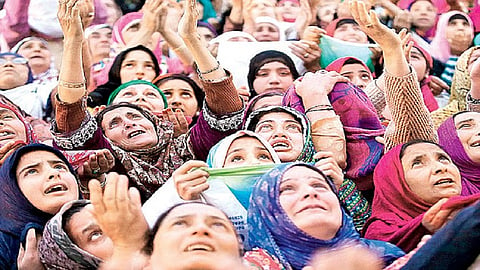

Some work that I am engaged in currently makes me believe, more than before, that patriarchy does not just describe male actions of domination -- but also how some organisations and cultural narratives function. It is a clear reminder that patriarchy like most forms of oppression has a way of trying to convince us that there are no alternatives; things will never change as they have always been there as they have to be (Crunk Feminist Collective). Moreover, there are more upholders of the idea of patriarchy, than its demolishers. What I find extremely dangerous is that those who are entrusted with the job of delivering justice, the law-makers and law protectors, to the self-appointed custodians of women’s rights, not only display patriarchy in their decision-making approach, but also otherwise, are more often aggressive and misogynist. To my mind, patriarchy is downright oppression of women. It is multilayered. For all we know, it operates through inequalities at the level of the law and the State. Most importantly, it operates through the home and the workplace. It is upheld by powerful cultural norms and supported by tradition, education and religion. Like many experts have reiterated, it reproduces itself endlessly through these patriarchal norms and structures. Therefore it is deemed natural or inevitable. This reminds me of an article I read some time ago. "Not all men enthusiastically uphold patriarchy or benefit equally from it," it read. On the other hand, the article suggested that (some) women do a great deal towards supporting it. In as many words, the writer wrote that the idea of patriarchy allows for the fact that, "however much we might loathe it, we all perforce, participate in it." This is as much my observation, too, accumulating from ground zero and reading in-between the obvious and the hidden. What else can be the reason for lower levels of reporting of crimes such as sexual assaults and domestic violence and still lower rates of conviction -- if not for the nexus between the these self-proclaimed saviors of women rights (private entities like NGOs), those who run State funded organisations primarily set up to promote women rights, the police and our judicial system? Why should it be than that only a few are brought to trial – a fact that, in isolation, illuminates very little? If all this is not indicative of the fact that patriarchy is still as wide-spread, even as we may believe that aggressive attempts are being made to demolish the structure, than what is?
While many experts have argued that if women gain equal rights in society, patriarchy will be at least sufficiently tempered -- there are others who argue that even if equality were achieved, patriarchy would still exist, because human institutions – political, legal, educational and cultural – are themselves, in their bones –patriarchal structures. This to my mind is perfectly true. Closely monitoring the work of organisations claiming to deliver justice to aggrieved women in the State of Goa, I am learning that biases can be both conscious and unconscious. Cultivated over years through accumulated learning, biases get deeply embedded within a person’s beliefs. They are almost impossible to notice and may even come across as an individual’s value system. In truth, many biases manifest in such non-malicious ways that one doesn’t stop to think that they could be very detrimental to one’s own progress and that of one’s organisation.
A lawyer friend recently explained to me the extent of patriarchy in the temple of justice – the court which is supposed to uphold people’s trust in it as the custodian of rule of law as well as the custodian of constitutional values by the common people. Courtroom is considered a space where domination and oppression is challenged and social as well as economic and political justice is facilitated. However, the lawyer said that often the courts reinforce masculine values while ignoring the fact that their prime concern is to disburse justice as per the constitutional and legal provisions. She said that biases exist in various forms in the everyday practice in the courtrooms. The nexus between some entities like NGOs or activists and the police which by and large carries a legacy of sexism coupled with the cultural and religious shaming of women; has all too well led to the general discouragement of women from speaking out. Nevertheless, there are some women who gather courage to fight for justice against such oppressive culture in this deadly nexus, gain small triumph in some form or the other because of the support they may receive from several quarters and above all because of their persistence and sheer grit. It is not because the above mentioned institutions suddenly become sympathetic or sensitive to women’s concerns or questions -- rather it is the resilience of these women who persist in their struggle, and therefore they could smash patriarchy that exists within the society. And these women need to be applauded for all their worth! Goa National Games 2020 mascot bulbul unveiled